
Take a Pass on this Convoluted and Highly Unrealistic Show!
I've been watching a number of Asian shows lately, and most of them are good, while a some are even terrific.I will point out that I didn't make it past the 12th episode. I couldn't believe what I was watching. The show is extremely uneven with the characters, and so unrealistic with some of the story elements, that I'd finally had enough!
The story is about Xiao-Shu a young woman in her late twenties who runs her own radio station. She's just caught her boyfriend cheating on her, and she quickly befriends Zhou Zhen, the son of a notorious gangster who's no longer in the business.
Xiao-Shu, the daughter of a retired policeman, despises gangsters and anyone who takes advantage of others by abusing their own power. She uses her radio station to lash out against such people, and thus, makes an instant enemy of Zhou-Zhen's father.
Meanwhile, Zhou-Zhen takes a job at the radio station to see what he can do to alleviate Xiao-Shu's feelings toward his father (even though she had no idea that they're related), and obviously, to also be closer to her.
This Taiwanese drama/comedy is highly formulaic, taking on the same character-types and plot developments that are in nearly every other Taiwanese drama. I've watched "Fall in Love With Me" and "Murphy's Law of Love," both of which are predictable but infinitely superior to this jumbled mess.
At one point, while Xiao-Shu and Zhou-Zhen are up on a mountain, a drunk driver flies down the path, nearly hitting Xiao-Shu. She hears a crash, seconds later, only to discover that the driver is drunk, and he's just hit a small boy, who lies unconscious on the side of the road. For a moment Xiao-Shu stares at the scene. Any normal person in a story that makes any kind of sense, would have had Xiao-Shu crying out with distress and rushing to help the boy. Instead, she completely ignores the boy and charges at the driver, who is trying to flee the scene. At one point, she actually opens the back door and jumps in.
That was it for me! Nobody with any brains at all, or with any sense of concern and worry over a child being hit by a car, would ignore the child completely and jump into a car to stop the driver! Nobody! Xiao-Shu had her phone with her, and she could just as easily have snapped a few pictures. Instead, we get a convoluted and contrived scene so that Zhou-Zhen is forced to help her. I ended it right there, barely five minutes into the episode. It was too amateurish to bear. How can anyone, calling themselves a "director" or anyone calling themselves a "writer" come up with such a mess?
If you're looking for something of much better quality, I recommend the two shows that I previously mentioned. The best drama I've seen yet out of the Asian market is still Korea's, "Descendants of the Sun."
Avoid this mess! It's just a waste of time.

Another Typical Taiwanese Drama...New Drama, Same Story
The reason that Korean and Japanese dramas tend to be superior is because they are able to change things up, for the most part. They don't rely on the same gimmicks, the same formula, the same story. Taiwanese dramas, are nearly all the same. My favorite one is still "Refresh Man." And it is largely because it doesn't follow the typical formula.Taiwanese dramas also have a tendency to make the female lead into someone who isn't very bright. She can scarcely see the obvious. The writers tend to confuse being naive with being dumb.
I have lived and worked in Korea, China, and Taiwan. The premise with women is to take their age and subtract about 10 years or so to get their true maturity based upon a lack of life experience. So, a woman who is 26, is like trying to date someone who is only about 16. There's still a lot of "young girl" there and not much "woman" yet. Many of the female characters are portrayed in this fashion, which to a degree, reflects many of the young women in Taiwanese culture. The same is true of China.
Another premise is that most Taiwanese dramas have is that only a rich man can adequately provide for a woman and give her happiness. This has literally been the case of every, single Taiwanese show that I've watched.
This show is about Mr. Fang, who tragically loses his fiancee in a car accident, and is, himself, blinded. Enter Yuxi, a woman who looks exactly like his former fiancee (of course, there is a connection), who is hired to be his caretaker. Of course, we have the early-on bumps in the road where neither likes the other one too much. Then, we have the rich man doing elaborate things, that ultimately softens her heart and causes her to look at him differently. Then, we have the fear and ignorance regarding their actual feelings. You can see the trend and easily predict how things will end. Why? Because it's how they ALWAYS end with these shows.
Still, the characters are mostly likable and well portrayed. Lorene Ren does a good job of giving us a very immature, naive, and occasionally funny Yuxi. Kingone Wang (Mr. Fang) portrays him with a softness, an integrity, and a poignantly charismatic businessman, who always seems to be able to see the bigger picture and to make decisions without allowing his emotions to get the better of him.
Overall, this series was okay, with bits of "good" sprinkled in. If Taiwan can somehow begin to diversify and change things up with their programming, I'd be eager to come back. For now, though, I think I'll stick with the Korean and Japanese markets. They offer a lot more!

The Coward and the Girl He Loves
Few things in life aren't so tragic as wasted opportunities. Some people might "cloak" a wasted opportunity in believing that they are doing what is best for someone else. That isn't the case here, even though the writer would like you to believe it is.Den is 30-year-old man working in the IT department of a company. He has no friends. People at his job scarcely even know his name. He hides behiind computers because he doesn't believe he's worthy of anything else. If he did, he'd find a way to make it happen. Instead, he's a recluse.
Nui is a 28-year-old woman in the marketing department of the same company. She's a bit stuck-up, and finds herself in a relationship with one of her bosses, who just happens to be married with a son. Of course, she's naive enough to believe that he's going to leave his wife. This is the woman that Den has a crush on, much like a 14-year-old kid in high school.
The entire company goes on a trip, and this is where things pick up. Nui, upon finding out that her boss's wife is pregnant, decides upon a suicide attempt. The doctor tells Den that her short-term memory is affected for one day. In short, she will have forgotten everything recent for a single day, but when she wakes up the next morning, she will have recovered her memory, but at the expense of that one day.
Den decides to let her know that he's her boyfriend. She has a hard time believing him. However, as the day goes on, she begins to find something endearing in his sad attempts to impress her. In short, they enjoy the day until upon the verge of an intimate moment, Den confesses his scheme, getting himself thrown out of her hotel room in the process. However, upon finding out that she is a mistress of her boss, Nui doesn't want to go back to that life, and realizes that she wants to be with the only person who loves her: Den.
Den, however, lacks the courage and the conviction to follow Nui's instructions to help her remember how much she loves him. Nui even records a video clip to help her remember, asking Den to make sure to tell her about it the next day, when she will have forgotten everything.
Because of his own sense of worthlessness, Den doesn't do what Nui has asked of him, and so he deletes the clip. One can't feel sorry for Den, nor even think that he's being noble and selfless. He is, in fact, a coward. When love is presented to you, you don't turn your back on it. You don't dismiss it. You take the opportunity that love provides. In short, it's a very pathetic act on his part. But then again, someone who doesn't love themselves enough will do exactly what Den did. So, in truth, he's being who he believes himself to be.
There are some plot holes that don't entirely make the film work, not to mention an abrupt and unfulfilling ending. Why didn't Nui simply write a note to herself about the clip? She could have sent herself a message or even a note about her feelings for Den. I found this to be very short-sighted on the writer and director's part.
The characters are certainly interesting enough, even if both are very flawed and lacking in any true love for themselves. The performances are good as well. However, the movie feels like a train that ran out of track by the time the end comes, leaving one to feel, "Is that it?" Unsatisfying, to be sure.
If nothing else, it should warn people about the "Dens" and the "Nuis" of the world. If you see one, be sure to run the other way!
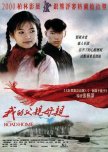
You Might Be Hard=Pressed to Find a Sweeter and More Loving Film Than This Masterpiece!
With all of the complex love stories that come out of Hollywood these days, you sometimes enjoy the refreshing feeling of a love story that is simple. I am not necessarily stating that one is better than the other, but you often find that many complex love stories just don't completely work. The Road Home is a beautiful, simple love story that is as simple as the time and location in which it takes place, and the pieces fit together like a simple jigsaw puzzle.The son of Zhao Di has come home to the village where is mother is from. He learns that his father has passed away. While the son grew up in the village, he has spent much of his adult life in the city. He has come home to be with his mother and to help her makes plans for his father's burial. His mother insists that his father be walked from the city hospital back to the village. Understand that this is no easy task since the village is good distance from the city. Her son tries to talk her out of it, but she is adament. And it is in the re-telling of how Zhao Di met her husband that convinces both the son and audience to understand why she wants to walk her husband back to the village.
The film takes off from here as the talented Zhang Ziyi portrays the young Zhao Di. She is an eighteen year-old girl living with her blind mother. She is a beautiful young woman with many suitors wishing for her hand in marriage. She has turned them all down. We don't know why except that we can guess that she hasn't found what she's looking for in a husband. Enter Luo, the new school teacher who has come to the village after living in the city. Zhao Di is immediately captivated upon first seeing him.
The sweetness in this film is in the simplicity of the village and the time. Water must be fetched from nearby wells. Looms are used to make clothing and cloths. And even the "courtship" that is done more by Zhao Di than by Luo is sweetly simple. She uses her culinary talents to make the best dishes with the hope that Luo will eat from her dish. She waits by the road for one glimpse of Luo. She walks to the well that is near the school for the chance that she might see or hear Luo.
People often make the mistake that the more primitive a technological country, the more unhappy the people must be. And yet,Zhao Di is not an unhappy girl. She is an excellent cook, and she enjoys looking after her mother. You get the sense that she does this not out of a sense of duty, but because she wants to. Zhao Di never lives anywhere else but in the village. The village is where she is happy.
Zhang Ziyi is simply brilliant is capturing the sweetness and determination of Zhao Di. She portrays Zhao Di with a fierce persistence to win the heart of Luo at any cost. You will see several scenes in which she demonstrates this.
I must mention the cinematography. The locations and colors that are captured reveal an almost magical world with golden leaves on the birch trees and snow-swept hills of winter.
Director Yimou Zhang does a great job of incorporating the technology of the time period. In many ways, I was as captivated by the use of the loom, the sweatbox used for cooking dumplings, and the walk to the well as I was of the sweet love story. I like his use of black and white in the future, and then the use of color for the past. Most directors would do it the other way around. And yet the color used for the past seems to show that it is revealing a happier time when young Zhao Di was in the fullness of her life, and the black and white showing how life is swiftly coming to an inevitable close for her after the loss of her one true love.
The Road Home will capture your heart with its story and your eyes with its images. Many saints, masters, and philosophers over the course of the centuries have stated that love is actually very simple; it is we who make it complex. This beautiful film seems to truly capture that idea.

Incredible and Enjoyable Series With Plenty of Thrills and Suspense!
I have only been getting into Asian TV shows for about three months now. Some have been good, some have been so-so, and a few have been fantastic! This is one of those "fantastic" shows that's up there with "Good Morning Call" for me. In fact, this one may even surpass that one."Erased" is based on a manga series about a young man who is a manga artist and has the ability to go back in time. When this happens, Saturo calls it a "Revival" in which he looks for something that is wrong/about to happen. He then does his best to prevent/change the tragedy from occurring.
After the brutal murder of his mother, he finds himself sent back to his childhood days. He realizes that he has the chance to save, not only his mother's life, but the lives of several children who have been targeted by a sadistic killer.
The story is expertly crafted to provide enough suspense and suspects to keep you guessing who the real killer may be. It also very deftly handles the beautiful relationships that Saturo forms with several of his classmates, but with Kayo, in particular. In a previous timeline, she is a victim of the killer, and Saturo is determined to befriend her and save her life if he can.
This is a series that I binge-watched over the course of just a few days. Every episode kept me wanting more. And after it was over, I realized that there was really nothing wrong with the series. The performances were fantastic, from the child actors to the adults.
It also had enough touching and heartfelt moments to balance the mystery, suspense, and darkness of a serial killer.
I have not read the manga series, but I'm certainly glad that Netflix added this incredible series to their list of quality programs. My only regret is that the series ended. I wanted more. Guess that means I'll have to watch it again!
*Since I wrote this review a couple of years ago, I've already rewatched this great series!

The series tells the story of a South Korean special forces officer, Yoo Shi-Jin (wonderfully portrayed by Joong-ki Song) and the civilian medical doctor, Kang Mo-Yeon (Hye-Kyo Song), whom he develops feelings for. So, how does a man, whose job is to take lives in order to protect others, makes a relationship work with a woman who is sworn to save lives, no matter who they are or what they've done? That is one of the central themes of the series as well as Dr. Mo-Yeon's constant grappling with her heart over a man who is always putting his life on the line.
Joong-ki Song brings a wit and charm to the very likable Yoo Shi-Jin. He never takes things too seriously except when the people he cares about are in danger. He has a wonderful sense of humor. He, and best friend, Sergeant Seo Dae-Young, seem to get into trouble a fair amount, leading to some fairly humorous situations.
The equally charismatic Dr. Mo-Yeon is a woman dedicated to her work. She has dreams of becoming a professor but quickly finds herself in a situation that sends her and her medical team to volunteer in the war- torn fictional country of Uruk.
What makes Descendants of the Sun special is that it never gets bogged down in melodrama. It never takes itself too seriously, but delves just deep enough to care about the characters and what might become of them. While there are a few tense situations, the series is equally light-hearted and, most of all, sweet.
I can see why so many people around the world have quickly become enamored with the series as well as with its characters. There are enough moments to make you laugh, make you cry, as well as make you wonder and hope if it is possible for two characters in seemingly opposing professions to be together. It's a fascinating character study into this dynamic.
I have only recently gotten into some Japanese and Korean shows, and for me, Descendants of the Sun is easily my favorite. In fact, after over 40 years of watching TV shows, I put this one up among the very best that I've ever seen.
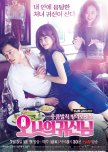
You'll Laugh, You'll Cry, You'll Fall in Love with "Oh, My Ghost!"
Oh My Ghost! has a great premise of a young, shy, timid girl (Bong-Sun) who can see and even communicate with ghosts. Petrified and "harassed," she finds herself constantly tired due to lack of sleep and doing her best to avoid these pesky spirits! She even goes so far as to cover the walls of her tiny apartment in talismans and anything else that might keep the spirits away.Enter Soon-Ae, a ghost who spends much of her time eluding the local shaman (Seobingo), who can not only see and interact with spirits, but she can catch them too!
Bong-Sun works at a restaurant under a nationally recognized chef who is constantly scolding her for her lack of attention, lack of energy, and most importantly, her lack of confidence. Constantly apologizing, she drives Chef Kang crazy, as well as her co-workers.
Once again, after being chased by Seobingo, Soon-Ae takes possession of Bong-Sun, and this is where the fun begins! Through the sudden habitation of Soon-Ae, Bong-Sun's personality is altered. She's confident, not shy at all, and even demonstrates innate cooking abilities, much to the shock and surprise of Chef Kang and his fellow cooks.
Of course, the series is about how Bong-Sun and Chef Kang will come together, as he's completely caught off-guard by her sudden forwardness and flirtations.
The series is a complete delight! I can't say enough about Bo-Young Park's performance. She's able to switch personalities of Bong-Su and being possessed by Soon-Ae with all of the deftness of a master at her craft. The beauty of this is that Park is equally charming in both "roles." She is so cute and adorable, that you love her in either part. Her charm is what drives the series.
Of course, there is also a mystery to be solved regarding Soon-Ae and how and why she died. Her story is just as interesting and intriguing as Bong-Sun's. In fact, it can be noted that her story is touching as well as tragic. So much so, that you may find it hard to choke back a few tears. Seul-Gi Kim does a magnificent job in this role.
The series is a perfect balance and blend of drama, comedy, suspense, and romance. The four cooks who work under Kang are a perfect fit when a laugh is needed. They are hilarious and they work off each other so wonderfully. The entire cast is to be commended.
There really isn't anything contrived at all in this series. The plot flows smoothly without anything feeling forced. I've seen too many plots where the writers and the director loses sight of the story and feels that they have to come up with something that is scarcely believable or plausible.
Oh My Ghost! is a terrific series that you may have a hard time stopping after watching just one episode. You'll find yourself laughing a lot, shedding a few tears, and cheering in the end for Bong-Sun and Soon-Ae. Both of them realize that the key to Life is to Love. Because without it, Life is pretty dismal, whether you're alive or a ghost!
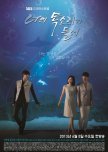
Terrible Writing, Acting, Directing and Story...So, What Is There to Like?
“I Hear Your Voice” is a series that never seems to be able to figure out what it wants to be. Unfortunately, this becomes even true of the characters, who don’t know who they want to be either. The writer took many liberties for this story, even going so far as to make up things just to make the story work. This is one of the cardinal “sins” of writing. Always write about what you know. And never change a character for the sake of the plot.Many K-Dramas successfully blend various genres such as comedy, drama, romance, and even thriller-aspects. Most of the series I’ve watched do this extremely well. This is one of the few series that does this very badly. It uses comedy when something isn’t funny. It uses romance when things are cheesy and not even romantic, and it completely undervalues the killer of the story, causing him to tap-dance around in order to prolong his presence in the series for no real reason. At first, he seeks to kill. Suddenly, he completely changes tactics and wants to be understood. I've never even read about REAL killers doing things like this!
We also have some of the absolute worst acting performances from an ensemble cast that I’ve seen in a very, very long time. Everything from hamming up scenes to overacting, to being completely disingenuous are just a few of the major mistakes this cast makes. Usually, it’s only one or maybe two actors who are weak. In this series, only one or two actors are actually strong and believable.
The story is an intriguing one in which Park Soo Ha and Jang Hye Sung are brought together one fateful night when Min Joon Kook slams into Park Soo Ha’s car and proceeds to brutally murder Park Soo Ha’s father right in front of him. Park Soo Ha himself was about to be killed as well until a young Jang Hye Sung witnesses the crime and proceeds to take photos and be a witness to the crime. This brings about an ominous threat from Min Joon Kook who swears revenge upon Park Soo Ha and Jang Hye Sung, whom he attempts to strangle to death in the courtroom.
Years later, Park Soo Ha is a high school senior who has never forgotten Jang Hye Sung and what she did for him. It’s also obvious that he’s very smitten with her. Park Soo Ha is also a young man capable of reading people’s thoughts. Obviously, this can be very unnerving for anyone who knows of his ability. He trains hard in fighting, knowing that one day, Min Joon Kook is likely to come looking for him as well as Jang Hye Sung. Coming across her, he begins to follow her, especially after learning that Min Joon Kook has been released from prison on “good behavior.”
Jang Hye Sung becomes a public defender. Not because she feels any sense of responsibility, but because she feels she can do the job. And “doing the job” entails lazily arguing for a lighter sentence. She never believes her client and simply feels that her only “duty” is to get a reduced sentence for them. She’s incredibly immature, conceited, and believes that the whole world revolves around her. She’s vain and has no problem showboating when she’s defeated anyone in court. If something goes wrong, it’s always the other person’s fault. She loves playing the victim. If someone lies, she holds a grudge. If she lies, she feels justified. She’s a true hypocrite in every sense of the word. There isn’t much that’s likable about Jang Hye Sung.
Cha Kwan Woo is a mousy, sheepish man who’s dropped out of the police force in order to become a public defender. He seems to have high values despite being a very wishy-washy shell of a man. He constantly looks as though he’s on the verge of tears, and he’s immediately infatuated with Jang Hye Sung. A real head-scratcher is why anyone would be enamored with Jang Hye Sung! And we’ve got an absolutely ludicrous triangle involving these three characters, when none of them are worth it.
There are some serious plot problems in this series. At one point, Cha Kwan Woo feels compelled to defend Min Joon Kook when he’s caught for murdering Jang Hye Sung’s mother. Of course, Min Joon Kook comes up with a ridiculous story, and Cha Kwan Woo buys it. The real problem, however, is that at this point in the story, Cha Kwan Woo is dating Jang Hye Sung. And yet, at no point, is a “conflict of interest” raised by anyone! Mr. Shin, the veteran of the public defenders, cowardly removes himself from consideration rather than realizing that it’s his job to take the case. Of course, Cha Kwan Woo is so gullible, one has to figure out how this man could ever be a public defender, let alone a police officer. He also has zero police skills! At one point, he sneaks up on Min Joon Kook to capture him—from the side! Anyone with peripheral vision (and supposed police training) would never do that!
Another ridiculous point in the story is that Min Joon Kook cuts off his own left hand—with a 15cm knife! I’m not sure the writer had any notion of just how painful and difficult it would be for anyone to try and cut off their own hand with such a blade. They try to justify it with a pitiful demonstration that nobody with a brain would ever buy!
At one point, when Min Joon Kook is suspected of being murdered by Park Soo Ha, a witness claims to have seen Park Soo Ha, and yet nobody goes out to speak with the witness or even bring the witness to court until nearly after the fact. Talk about lawyers not doing their job! I had no idea they were so incompetent.
We have judges who roll their eyes and show emotion in court (something judges are not allowed to do!) during testimonies. We also have jurors who constantly nod their heads at every, single thing. I’ve served on juries. Jurors don’t do that, and certainly not all of them at the same time!
The courtroom scenes are just about the worst I’ve ever seen, and I’ve seen a lot in movies and TV shows. It all played out like a bad soap opera by directors and writers who haven’t a clue what really goes on in a courtroom and what court proceedings and protocols look like. I especially laughed at Jang Hye Sung wearing miniskirts to court. Somehow, I don’t think a judge would allow that kind of attire.
This is the first series I’ve seen with Lee Bo Young, and she is just plain awful. She can’t seem to find the fine line between being comedic or being dramatic. I understand that her character is supposed to be haughty, but she comes across like a spoiled high school prom-queen, constantly flipping her hair and giving snide remarks. In short, she’s just not believable in any aspect of her character. She’s absolutely clueless. She also has zero chemistry with anyone in the series. She reminded me of Denise Richards, one of the worst American actresses (or any actress!).
Yoon Sang Hyun (Cha Kwan Woo) is almost as bad. He often says his lines with a wooden expression as though he’s reciting a poem in front of a school class. I understand that his character likes Jang Hye Sung, but acting like a 15-year-old milksop is hardly the way to endear the viewer. He’s simply pathetic despite his ideals as a lawyer being very noble.
This is the second series I’ve seen with Lee Jong Suk (first being “Hymn of Death”). He’s easily the strongest of these three. He reminds us that his character is a good six or seven years younger than Jang Hye Sung, but he also comes across as easily the most mature of the three. While he’s prone to losing his temper, he’s also the most levelheaded. However, his age and lack of world experience prove to be his weaknesses. Lee Jong Suk juggled this complex character rather well.
I’ve seen Jung Woong In (Min Joon Kook) in a number of series. He’s good a playing the villain or the antagonist. However, he really hammed up and overacted his role in this series as he was obviously trying to find the line between a sadistic killer and a sympathetic victim. He’s prone to shouting way too much—especially when his character wouldn’t—and spewing ridiculous nonsense in his tirades. I would have preferred a calmer and cooler killer who revels in his intelligence rather than some madman.
Yoon Joo Sang (Mr. Shin) and Kim Hae Sook (Jang Hye Sung’s mother) were easily my favorite performers of the series. We had some peripheral characters, such as Park Soo Ha’s high school companions, who brought absolutely nothing to the story. I had a hard time figuring out if Kim Choong Ki was his friend or not, since they were constantly engaging in fist fights. So much for being friends.
The writer was clearly making it up as you go along without any notion or idea about how things actually work in the real world much less the courtroom. Perhaps the writer watched too many dramas and thought, “Hey, I can do this!” Wrong.
The music was equally bad, playing light, fluffy songs at points when something dark and sinister was about to happen. That made no sense either. The series failed as a romance, failed as a comedy, and only barely stayed afloat as a thriller. This “ship” should have been sunk before it ever left port.

The Very Grumpy, Immature, and Unlikeable Oh Mi Joo Sinks This Promising Series!
I actually watched the first three episodes all in one day. At that point, I was hooked with the story of a well-known athlete who defends a fellow runner who's being terrorized and brutally beaten by two low-life, fellow athletes. He doesn't care that this action will cost him his reputation and even his career, much to the consternation of his selfish, power-hungry father who uses the members of the family like tissue.Ki Seon Gyeom is a lonely young man who may not save himself from trouble, but he will always help others without a second thought. In many ways, he's a very noble man with a lot of integrity. Having finally defied his father and vowing to live his own life, he isolates himself even more with the assault scandal. There's nothing much nobler than a person helping someone who can't help themselves. This character is wonderfully played by actor Yim Si Wan, whom I absolutely liked in Misaeng. However, due to his somewhat introverted personality, he's not very good at being by himself or expressing his feelings. It would be a mistake to say that he's shy, rather he's cautious. And why? When you're abused even by your father, it's can be challenging to trust enough to share your thoughts and feelings with anyone else.
We also have Oh Mi Joo who is fairly opposite of Ki Seon Gyeom. She's relatively poor. In the first few episodes, she's somewhat sympathetic until it becomes very apparent that she's just a very bitter, petulant, and immature young woman.. She's quick to make assumptions and jumps to conclusions easily. She often pouts and rarely smiles with a set, tight scowl seemingly always on her face. Despite her obvious feelings for Ki Seon Gyeom, she becomes easily irritated with his communication style. But rather than even attempting to talk things out and understand him, she barks at him and is always upset with him. She blames him for pitying him. Cowards are those who always blame others for their own problems. She turns out to be as pleasant to be around as a rattlesnake--and just about as appealing too! Frankly, by the sixth episode, I was already loathing her character. and it made me cringe about how much she mistreats Ki Seon Gyeom. She's an extremely unhappy person, and most unhappy people will always find a way to pull someone else down into their own misery.
As the focus diverted from the scandal and became more about the romance, the series lost its appeal for me. Had they kept both intact and not suddenly made Ki Seon Gyeom such a doormat to the bossy and overbearing Oh Mi Joo, I would have stuck around to see how things play out.
The only truly likeable characters were Ki Seon Gyeom, his new friend Lee Young Hwa and Seo Dan-Ah (a woman who can hold her own with the male bully counterparts in her field! And, frankly, a far more appealing woman than Oh Mi Joo)
I had high hopes for this series with its relatively high ratings, and after just finishing Touch Your Heart, I was hoping for something comparable. Moving on to find characters who are more mature and far more likable than what we got here!
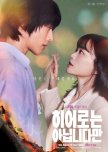
All You Ever Have is Right Now
This is definitely not your typical drama, which is actually a good thing. The series has enough curveballs and plot twists to keep the savviest viewer guessing right up to the end. These “time” plots are among the most challenging for a writer to track because there are so many elements. Perhaps that is why very few of them actually end up working, while so many others end up with enough plot holes to look like fly swatter by the end.We have a family with special abilities. Bok Gwi Ju has the ability to go back to the past to his happiest moments. However, he doesn’t have the ability to affect the past, or at least, so we think until Do Da Hae shows up; a con-woman who is initially only after the Bok’s money on behalf of her loan shark of a “mother” and her adopted family. We quickly find that Gwi Ju can actually communicate with Da Hae and even interact with her. However, for the first few episodes, Gwi Ju is suffering from severe depression after a car accident take the life of his wife while he was “away.” He drowns himself in his sorrows through alcohol, even failing to be a father to his daughter, I Na.
Bok I Na is a young preteen who spends all of her time on her cellphone, not wanting to look anyone in the eye. We later find that her special ability is to read the minds of anyone she makes eye contact with. Her anxiety of reading minds isn’t just limited to her classmates, but she believes that she’s the reason why her mother was killed. Both father and daughter are suffering from tremendous guilt.
Bok Dong Hee has the ability to fly. However, she finds herself “weighted down.” Literally! Putting Claudia Kim in a fat suit really carried off the character well as a woman who finds her only solace is in food.
Last, but certainly not least, is the matriarch of the family, Bok Man Heum who has the ability to see the future through her dreams when she’s asleep. In many ways, she’s become addicted to her ability, not only through the fear of something bad happening to her and her family, but also as a means to acquire future knowledge, and thus, making herself and her family extremely rich.
Do Da Hae seems to show up in the Bok family on a whim, but nothing is as it seems, and she later finds that the mysterious “fireman” who saved her from a school fire when she was in high school, is none other than Gwi Ju. She soon finds herself wrapped up in the “time travel” plot of the Bok family as well as falling hopelessly in love with Gwi Ju as well as with his daughter, I Na (who actually discovers Da Hae’s true intentions through her mind-reading ability).
The head of Da Hae’s adopted family is a cruel, vindictive loan shark, Baek Il Hong, whose plot is to get Da Hae married off to Gwi Ju with the hopes of acquiring some of their wealth. Still, very few things in this series follow the “typical” plot line, and this is what truly makes the series so special.
Is it possible for the “villains” to actually turn over a new leaf and to actually have good intentions? Is it also possible to change the future if one already knows what is going to happen? So many TV shows/movies have dealt with this question. The irony is that the only point in time that any can experience is “right now.” There is no future or past, which is something that Einstein himself proved: that all of time and space is relative. As Socrates states in “Peaceful Warrior,” all we have is right now. More and more people are realizing that the only power you can ever have is in this moment. Life is choice, which negates the ridiculous belief that there is somehow a “fate” or a “destiny” involved. The only “fate” or “destiny” that exists is in whatever moment we decide it to be. Those who believe that the universe is a random place where they are controlled by fate or destiny are cowards at heart. Why? Because they fail to acknowledge their own power of choice.
The series only has a few minor flaws to it, which isn’t a bad thing, and since it’s a “time plot” we can hardly blame the writer too much. First, Da Hae attempts to make it appear that she’s “died” in an accident to prevent Gwi Ju from going to the past to save her (which, if he does, he will die). She and her uncle set things up while Gwi Ju is in the past. The only problem with this is, how does Da Hae know how much time she has before Gwi Ju comes back? It’s never explained, and for all she knows, Gwi Ju could be back within seconds or minutes from whatever point in the past he’s returning from. And yet, she acts as if she has all the time in the world, which makes no sense.
Second, in the last episode, Gwi Ju is holding teenage Da Hae on the windowsill, telling her to jump to the blow-up fire cushion below. However, as much as time as it takes Gwi Ju to explain things, he could have easily jumped out of the window with her. It would have been more convincing if something had happened to prevent him from doing this. Again, these are very minor points, and they certainly don’t detract from the story.
This isn’t your typical superhero series. Many of the people in this series are selfish and greedy. They only care about their own happiness. Gwi Ju is so caught up in his own pain, that he neglects his own daughter. Da Hae is so caught up in getting out from under her “mother” that she initially fails to realize that there is already a loving family waiting for her. I Na is so caught up in trying to avoid pain, that she isolates an alienates herself from everyone around her. Bok Man Heum is so consumed with her dreams, that she fails as a mother and a wife. Everything has its price, even for those with special abilities. Why? Because in the end, they are people too. And the most captivating of superhero movies and shows are those that show us the “human” side of the characters. Not their superhero abilities.
Performances in this series are absolutely fantastic, but for me, there was one standout. Park So Yi (I Na) was incredible in this series. This young lady has an incredible future ahead of her! At a young age, she is already able to convey feelings and emotions with simple looks and gestures; something that many adult actors and actresses are unable to do! She makes us feel her pain of loneliness, guilt, and isolation of someone who believes herself to be an outcast, not only at her school but within her own family as well! Park So Yi is able to show us the terrible burden that I Na carries and carries alone. I was captivated every time I Na was in a scene!
If you’re looking for a very “atypical” drama, you really can’t go wrong at all with this one! It will have you laughing and crying, and perhaps help you ask yourself the important questions such as, what is really important in life? Money or love? Money or family? And also to never forget to live life in each moment.

Be A Diamond!
Itaewon Class may be one of the most inspirational series I’ve ever seen. There is tremendous power in seeing one person doing all he can to achieve a goal. It’s another thing when that person inspires others to do the same by placing his faith, trust, and love in them. And Gwang Jin’s poem, “I’m the Diamond” which is read at the end of the pivotal 12th episode, sums up everything that the series is about.Park Sae Royi is a young man who loves his father dearly. Sae Royi is a principled man who believes that people should be treated appropriately. Upon seeing a fellow high school student being bullied by Jang Geun Won, he intervenes. Sae Royi doesn’t realize that Geun Won’s father, Jang Dae Hee runs one of the largest corporations in the country. Of course, this is another series where the corporate bully steps all over the weak. Dae Hee demands that Sae Royi get on his knees to beg for forgiveness, even in the presence of Sae Royi’s own father who works for Dae Hee. Sae Royi refuses and is promptly expelled. Fearing his father’s disapproval, Sae Royi is shocked to learn that his father couldn’t be prouder of a son who sticks to his principles unwaveringly. When Sae Royi’s father is killed in a hit-and-run accident by Geun Won, this sets in motion a chain of events that provides Sae Royi with only one goal: the destruction of Jangga Co., the downfall of Dae Hee, and Geun Won brought to justice for his crime.
Kobe Bryant’s English teacher once told him, “Rest at the end, not in the middle.” Sae Royi is a patient man with his eyes never wavering from his goal. He spends seven years after getting out of prison doing odd jobs, reading Dae Hee’s biography, and arming himself with money and knowledge to carry out his plan.
Sae Royi is one of the most inspirational characters, who reminds me a lot of Rocky Balboa; the little unknown “David” attempting to take down “Goliath.” He opens a small pub in Itaewon. It doesn’t take us long to see how much faith and trust he has for his employees and friends. He believes in them even when they don’t believe in themselves. He harbors no ill-will toward them, but he’s also quick to call out any of them if they mistreat or disrespect others. I’m sure that many would love to work for a boss like him!
Sae Royi’s true weapon, however, comes in the unlikely form of Jo Yi Seo, a young woman with an IQ of 162 who runs her own blog, carrying a massive platform of followers and subscribers. She’s rough around the edges, to say the least. She speaks her mind, never apologizing if her views and remarks hurt someone. To her, being honest with the truth is more important than tapdancing around with trivial and whimsical flattery that does nothing. While Yi Seo can be a little irritating at times, this girl knows what she wants and will do whatever it takes to attain it. She is so vivacious and direct that she doesn’t even think twice about telling Sae Royi that she likes him, or even warning those who get in Sae Royi’s way, that she will crush them. Kim Da Mi steals the series, in her depiction of Yi-Seo, in my opinion. She captivates and intrigues in every, single moment she’s on the screen. I’ve only seen her in “The Witch,” and “Our Beloved Summer,” but I’m enthralled by how diverse her characters are and how well she performs them. Yi-Seo quickly became my favorite character of this series. Tell me someone who wouldn’t want a veritable tigress for a companion; someone who will be in those trenches with you through thick and thin?
On the other side, we have Oh Soo Ah, who is Sae Royi’s high school classmate and protégé of his father’s. Oh Soo Ah is someone who will always straddle the fence; someone who is afraid to stand up for anyone or anything. At heart, she’s a true coward which is what all fence straddlers are. Too afraid to pick a side/position, they sit and watch. Oh Soo Ah loves the fact that Sae Royi likes her, but she makes no apologies for being completely unprincipled, including accepting money and working for Jangga Co, regardless of what happened to Sae Royi’s father. She is also incredibly superficial and selfish. Fortunately, for Oh Soo Ah, Sae Royi doesn’t hold it against her. He’s a bit naïve and gullible when it comes to Oh Soo Ah. When we see Yi-Seo with Oh Soo Ah, it’s easily apparent who the stronger woman is, and it’s hilarious each time Yi-Seo hits Oh Soo Ah with the truth of why she’s such a coward, exposing her at each and every turn. Yi-Seo is nobody’s fool, especially Oh Soo Ah’s.
Also take notice that Oh Soo Ah has a list of conditions that Park Sae Royi must meet in order to date her. Yi-Seo has none. And love never has conditions.
It's a true pleasure watching the journey of Sae Royi and his employees as they slowly rise up, deal with setbacks and even being virtually knocked out, only to come back stronger than before. They may get knocked down, but they keep getting back up. Slowly, we can see the believing in people and treating them right, begins to gain footing against Dae Hee and his unprincipled manner of doing business, where people are nothing more than pawns to be used, including his own sons.
The story arc even takes on discrimination, and beautifully so, as Sae Royi hires the black son of a Korean father as well as a transgender cook. In a world where transgenders are mocked, reviled, and frowned upon, the series strikes its own high point when Hyun Yi is about to go on a cooking show, and she’s betrayed when her “transgender” status is made public. While Sae Royi sticks by her side and lets her know that she can leave, if she wants, it’s Yi-Seo who calls her up on the phone and reads her the poem, “I’m the Diamond.” Yi-Seo knows all about just being who you are and never apologizing for it to anyone for any reason. It’s a remarkably powerful scene that should give anyone goosebumps as well as something to think about.
Performances in this series are absolutely stellar with Park Seo Joon, Kwon Na Ra, and others. Still, as I’ve already pointed out, Kim Da Mi is the highlight with veteran Korean actor, Yoo Jae Myung (Dae Hee) who’s been impeccable in everything I’ve seen him in (Stranger, Strong Girl Bong Soon, Vincenzo). He brings the corporate mogul to a whole new level, and the series wouldn’t have been nearly as effective without him.
Itaewon Class is a series that should get anyone fired up to pursue their goals and dreams. It’s a marathon, not a sprint, and we see why careful planning and steadfastness are necessary ingredients as well as being willing to lean on those who want to march right along side you. It’s also a series that encourages people to always fight against discrimination and injustice no matter where they rear their ugly heads. Don’t let those with money and power call the shots. Even the smallest person can rise up and fight effectively. The mosquito is one of the smallest predators on the planet, but it also kills far more people than any other animal. Sae Royi reminded me of a mosquito. He antagonizes, pesters, and bites, forcing a reaction.
The diamond is the hardest substance that we know of, and yet it's created due to enormous pressure. But once it's created, it can withstand anything. Don't let pressure get to you. Use it! Be a diamond!
Itaewon Class feels like a series that sits nearly alone in the echelon of series that inspires and encourages us to believe in the definition of nobility: being better than you used to be. Perhaps, that is reason enough to understand why this series resonates in the hearts of so many who have watched it.

Just Might Be The Worst Korean Series I've Seen So Far--And That's Saying Something!
Someone decided to steal the plot from “Hometown Cha Cha Cha” and messed it up—badly! “Hometown Cha Cha Cha” is infinitely better than this plagiaristic story.We have a veterinarian who is conned by his grandfather to come to his small town to take over the practice while he and his wife are off on vacation. That was a badly contrived reason, especially since it’s under the false premise that something dire had happened to the grandfather, which draws Ji-Yul Han to the town. Of course, he’s upset that he’s been completely duped. Who wouldn’t be? Especially feigning an emergency! I would have left the town right then and there! The writers should have come up with a much better reason to get Ji-Yul to come to the town. This was a weak element that simply felt ridiculous.
The first couple of episodes are decent, but then it’s all downhill from there as the very uptight Ji-Yul is somewhat cold and aloof toward nearly everyone. Of course, nobody bothers to realize how he’s been conned into the job. They simply expect him to “fall in” and do his job with a smile.
Next, we have Officer Ahn. A woman who has no police officer skills whatsoever. Someone took actress Joy—who smiles, bats her eyes, and gives her little, “Tee-hee!” sound like some blond, blue-eyed woman without a brain in her head. I guess this is the only expression that Joy knows how to use. She’s a very weak actress who makes her role very unbelievable. And, of course, she has that “pouty” face down cold, like a thirteen-year-old when things don’t go her way. Very professional for a police officer who is unable to even deal with a thief.
I’m not sure where they found actor Sung Chul Baek (Lee Sang Hyun) but he’s terrible. He delivers his lines with such flatness that it sounds like he’s standing in front of a school auditorium and reciting a poem. I think I groaned more than a dozen times during the first five episodes as I watched this talentless kid try to sound tough; try to sound concerned; try to profess his romantic feelings.
The love-triangle is cliched, overused, and tiresome. I’ve said it before in several reviews that “My Beloved Summer” is the best series about young love. This one may be one of the worst. Every single cliché was used within the only five episodes that I watched. I couldn’t continue with the series. It was just not worth torturing myself. Especially when there are so many much better series out there. I’m just relieved that each episode was only about 38 minutes long—which felt entirely too long!
Hometown Cha Cha Cha was an absolute gem of a romantic series about a dentist who finds herself immersed in a small seaside town. This series is a poor imitation of that rich story, and without the cliches and silly romantic plots that you might find in a junior high school. The three characters in this series are just not very likable. I certainly wasn’t invested enough to find out how three immature people—adults supposedly in their late 20s, but act like they're all about sixteen or seventeen—resolve their romantic issues. None of them are worthy of any consideration. Officer Ahn is a tease, which I very much dislike as she toys with one man's affections while pursuing another. She's easily the most immature of the three.
This is the first Korean series I’ve stopped watching in over five years of watching them. For me, it was that bad. The series needed much better writing, far better actors, and something more unique and original, rather than trying to copy another series; a series that was truly endearing. In the meantime, I’d highly recommend acting lessons for Joy and Sung Chul Baek, especially. Any series these two end up in, I’ll automatically skip.
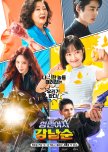
Inferior to the Vastly Superior Series, Strong Girl Bong Soon Do!
Strong Girl Nam Soon does its best to create its own unique storyline, despite sharing its universe with Strong Girl Bong Soon Do. Unfortunately, it's a cheap imitation that tries way too hard to be funny, intriguing, and insightful, and comes up short in all three.The original series with Bo Young Park was a series that always remained focused on its protagonist and also had a very intriguing thriller aspect where a serial kidnapper is on the loose.
This series attempts (and fails) to utilize three protagonists (from grandmother to granddaughter) and can never captivate the viewer because it's spread out too much. While all three are interesting characters, it's simply not enough. Half the time, I wanted them to shift back to Nam Soon. While the grandmother and Hwang Geum Joo (the mother) had some good scenes, it would have served the plot much better had they been relegated to secondary characters.
There also are some serious differences between the powers of Bong Soon Do and Nam Soon Do, which are never fully explained. Bong Soon had superstrength, and some invulnerability, but that was pretty much it. Here Nam Soon has superstrength, speed, enhanced vision, and immunity to some drugs, etc. In short, she's nearly as powerful as Superman, which makes her character less interesting. Superheroes who are all but unbeatable are boring, which is why Superman's powers have always changed throughout the course of the character. There are also many inconsistencies in Nam Soon's use of her abilities, especially her vision. It seems she can see things from miles away, but that's only great if you know where to look and what to look for!
Series like this one also tend to live or die by how good the villain is. In Strong Girl Bong Soon, the creepy guy targeting women was very well done, and he showed his ability to often outsmart Bong Soon. Here, we have a very "vanilla" villain in Ryu Shi Oh, who's a part of the Russian mafia and using a new drug that is targeted at the rich in order to get them to buy the antidote. Of course, the writers decided to use this as a method for Ryu Shi Oh to use the drug to give himself enhanced strength. Ryu Shi Oh isn't a very smart villain, and because of this, he's largely uninteresting.
The last two episodes are so ridiculous and anticlimactic, that you just can't wait for the series to end. We don't get the showdown that we'd hoped for, and we get Nam Soon being completely gullible and stupid by taking the drug and trusting Ryu Shi Oh.
However, the performances in the series are generally very good. For some reason, they decided to make almost all of the men in Nam Soon's family fat, lazy, or completely inept. I realize that this was done largely for comedic effect, but it just ends up being silly and tedious after the first few episodes.
While Lee You Mi is a decent actress (always wearing the same, goofy grin), she's no Bo Young Park who is vastly superior in just about every way.
Also, the little "superpower" song used in this series is a joke, especially compared with the vastly superior "Super Power Girl" from the original series that always managed to get the viewer pumped up for Bong Soon Do! The song used in this series is about as inspirational as watching Nam Soon's fat brother stuff himself.
The series left the door open for another series. Frankly, I'll pass. I'd much rather watch Strong Girl Bong Soon Do again. And Bo Young Park's guest appearance in the second episode was easily the high-point of this series!

Some of the Most Horrible Women Ever Put on Screen!
“Love Next Door” endeavors to be a light, sweet romantic comedy with some drama thrown in for good measure. What we end up with is a bunch of women who are barely tolerable, and sometimes, not even that. We get some domineering, controlling, meddling women who snap at the smallest of things. They are also selfish and cowardly in how they act toward each other as well as others around them. Frankly, I’m not sure how or why any reasonable person would want to spend five minutes alone with any of them. They are about as appealing as a pit of vipers.Choi Seung Hyo and Bae Seok Ryu are childhood friends who grew up together because they lived next door. Their mothers have also been friends for a long time as well, although there are plenty of times throughout the series when we wonder how and even why. Their mothers and two other women get together in their “Lavender Club” to hang out. What ends up happening is they spar, argue, and compete over everything. Believe it or not, this is how many women in Korea interact with each other. Everything is a competition and a fight for status. What’s especially sad is that they often use their own children to acquire that status. They’ll brag to others about what schools they go to, what educational academies they’re enrolled in, what grades they get, and even what areas they excel in. These are women who live vicariously through their children. They use them as pawns, which is why many of these so-called “mothers” aren’t even fit to be parents at all.
Seok Ryu has returned to Korea from being in the US with a prestigious company. Of course, her domineering, twisted mother, Mi Suk, can only think about how this impacts her, especially after bragging to her friends about Seok Ryu. Things become further complicated when Seok Ryu announces that she’s also broken off her engagement. Mi Suk nearly disowns her daughter right there on the spot. Mi Suk uses the pathetic excuse that, “I don’t want my daughter to live a hard life like me!” This is a lie. Mi Suk is only concerned about how Seok Ryu’s decisions reflect on her. Her anger is out of pure spite and selfishness.
Seok Ryu isn’t exactly an angel herself. We find out that she was diagnosed with stomach cancer and refused to tell anyone about it. She claims that she was sparing everyone the pain. Whenever someone pushes others away, it’s never to spare others the pain, but to spare themselves of their own. Seok Ryu is a true coward, and when Seung Hyo finds out, he justifiably berates her for her thoughtless and selfish act, even going so far as to call her a hypocrite and a coward which is 100% on the nose!
Seung Hyo is a young man who’s making his way in the architectural world, opening up his own firm and doing quite well. However, it’s obvious that he’s in love with Seok Ryu, even though he puts up defensive walls and refuses to let her know about it. When he finally does, Seok Ryu can only think about her own failings and problems, and she promptly refuses his advances. Seung Hyo laughingly buys a small carton of milk to be used to give Seok Ryu time to think it over. The stupidity of such an act is this: love isn’t about thought. If you actually have to think about it, then you’re very obviously not in love. What we have are two 34-year-olds acting like 16-year-olds. It might be endearing, but it’s actually quite pathetic. Even when they finally do end up together, Seok Ryu is too scared to tell anyone about the relationship, and so she begs Seung Hyo not to tell anyone. If you’re too ashamed to tell anyone about the relationship, then you have no business being in one. They scurry around like two kids worried about getting caught with their hands in the cookie jar!
We also have the third member of the childhood trio, Jung Mo Eum, who is my favorite character of the series. She’s a paramedic who doesn’t apologize to anyone for who and what she is. She unapologetically wears her heart on her sleeve, especially after meeting journalist Kang Dan Ho. It’s funny watching Jung Mo Eum berate Seok Ryu for being silly about her feelings for Seung Hyo, but after kissing Kang Dan Ho, she’s suddenly a 14-year-old girl hiding and running away from him. That was the only annoying thing about her. Kang Dan Ho has a cute little girl (his niece, in fact) that he’s raising all by himself. Korea still has problems accepting single parent families, and after finding out, Jung Mo Eum’s pathetic mother refuses to allow Jung Mo Eum to see him. Luckily, Jung Mo Eum lovingly tells her prejudiced mother that she has no say in the matter and that she fully intends to continue seeing Kang Dan Ho. Jung Mo Eum is the only strong female character of the entire cast! I would have preferred the series revolve around her rather than Seok Ryu.
Seok Ryu is very immature, but suddenly, like a light switch, everything is suddenly “okay” with her in the last four episodes or so. The writers must have had something against women to write them all to be such horrid people. It made me miss “Business Proposal” and “Our Beloved Summer” where we got good, strong female characters who knew their own minds, acted their age, and figured out for themselves how to navigate the pitfalls that came up before them.
Seok Ryu’s mother, Mi Suk, is about as cold and vindictive of a woman as I’ve ever seen in over 47 years of watching shows. I’m not sure how anyone was dumb enough to marry this woman. When Seung Hyo’s mother, Hye Suk, offers to pay for a trip to Europe, Mi Suk erupts angrily at her because she feels inferior to Hye Suk. The truth is, Mi Suk has very low self-esteem, and she feels inferior to everyone! It’s no wonder she feels the need to brag and show off her children. She’s a very pathetic character. One of the worst I’ve ever seen. And even when Seok Ryu desires to leave programming for a cooking job, Mi Suk explodes all over her! Her daughter, Seok Ryu is barely any better. Her own self-esteem is so low that she prefers to hide away rather than face her problems. I laughed out of pity each time Seung Hyo wanted to talk things out and Seok Ryu would scurry away like a rabbit saying, “I don’t want to talk about this!”
What’s truly sad is that the performances in this series are very good. I’ve seen Jung So Min in several series, and she’s always very good. Her only problem in this series is that she’s terrible at kissing scenes. Her mouth is always tight-lipped and it’s painfully obvious that she doesn’t like doing them. If that’s the case, she needs to stop doing romantic dramas. It hurts an actor’s performance if they’re unwilling to be genuine and get into a scene, no matter what it is. Also, it’s stated that Seok Ryu lost 70% of her stomach to cancer. I’ve known people who’ve had their stomachs stapled in order to lose weight. There is no way Seok Ryu would be able to eat as much food as she does based on that fact. This was something that the writers clearly overlooked.
The series definitely didn’t live up to the hype with mostly unlikeable characters, especially the women. While there may be many truths, it would have been nice to see these characters grow and evolve naturally rather than simply having the “light bulb” go off to suddenly fix the situation. It just wasn’t believable or realistic. It’s also sad to watch grown ups acting like children around their parents rather than having the guts to stand on their own feet. That’s not appealing either, especially in today’s world where women are finally becoming more empowered than ever before. Overall, this series was disappointing.
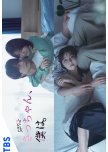
Trials and Tribulations of the Insecure
This short series attempts to put into perspective the trials and tribulations of people suffering from low self-esteem and tremendous insecurities. However, the series isn’t very effective in convincing the audience that it’s most important to love yourself first before you attempt to love another. The characters are people we should ultimately be sympathizing with, but we don’t because they don’t learn from their mistakes, nor do they evolve, even though the writer attempts to make it seem as though they have.Katagiri is a college student involved in a long distance relationship with Osanai Sachi, a girl he’s been seeing for five years. There is little chemistry between the two, and it’s clear that the relationship isn’t balanced as Osanai clearly has deeper feelings for Katagiri than he has for her. He is rather distant and aloof around her, and it’s theorized that this might have something to do with being abandoned by all of the women in his life. However, the writers never take the step or time to explore this more deeply. Instead, it’s glazed over like a train flying by a station.
Osanai adores Katagiri and sends him letters regularly. However, the letters sit in Katagiri’s apartment unopened, and he never replies. Instead, he finds some kind of solace in his next door neighbor, Shino. She’s a married woman seemingly trapped in a loveless marriage. What’s interesting is that she is just as distant and aloof as Katagiri, but for them, the sexual relationship enables each to feel something. So many people in this world take to food, sex, drugs, alcohol, or anything else that either helps them to feel some sense of pleasure or to escape from their problems. The real problem is that all pleasure is short-lived and never lasts, and escaping from one’s problems is also only temporary as those problems are still there once the effect of the “drug” wears off. No wonder there is so much misery in the world!
Osanai is an innocent and rather naïve young girl. She’s nineteen but often acts like she’s thirteen. She simply has no idea how the world works, and she also believes that her love for Katagiri can overcome their distance and their problems, which she never realizes until it’s too late. Naturally, she finds out about Katagiri’s affair with Shino, but rather than getting upset, she tells him that it’s okay with her, as she feels responsible for initially turning him down during a past attempt at intimacy. Katagiri assures her that he feels nothing for Shino, which somehow, is okay with Osanai, at least, at first. Osanai is much like a leech who believes that a painful relationship is better than on relationship at all. She’s so incredibly insecure that she can’t bear to be without Katagiri, and she makes the popular mistake of making him the center of her universe.
After they finally make love, Katagiri starts to come out of his shell when it comes to Osanai, but Osanai begins to realize that she can no longer overlook his transgression, and she eventually breaks up with him instead.
The series takes a very strange turn toward the end when Shino’s husband, who has been wire-tapping his wife’s apartment, finally comes forward and confronts Katagiri, and blackmails him into paying damages for the affair. Shino’s husband, rather than talking things out with his wife, simply plays the voyeur as he sits and watches Shino and Katagiri. This made no sense at all. I don’t know many husbands who would do this unless they took pleasure from the voyeuristic act, which is never even brought up by Shino after she finds out.
What we ultimately have are four very cowardly and immature characters with virtually no appeal at all. Katagiri cuts himself off, using his past as an excuse for his lack of feelings for Osanai. Osanai makes Katagiri her whole world. Shino battles boredom and loneliness by seducing Katagiri (even though he’s just as responsible), and Shino’s husband sits back and watches while his wife carries on with an affair because he’s too obsessive and possessive for his own good. By the time the series ends, we end up rooting for absolutely no one. The only character who shows even an ounce of integrity is Osanai when she realizes her mistake and moves on from Katagiri but not before she condescends to make love with Katagiri, not because she loves him, but because she fears losing him, which is never a good reason for sex.
This isn’t a very enjoyable series to watch, and frankly, I’m not sure that it’s supposed to be. But, what we are hoping is that Katagiri, the main protagonist, might actually grow up and face his insecurities. Sure, he pays off Shino’s husband, but that has nothing to do with facing your insecurities and learning to love yourself. That’s simply making up for getting caught. The only thing that I was relieved about was that they didn’t try to put Katagiri and Osanai back together again. That would have been ridiculous, and so that aspect of the ending was at least believable.
This series played out like a bad soap opera, and I’m thankful that it was only twelve episodes at only 20 minutes for each one. It was barely tolerable at that.


 1
1













